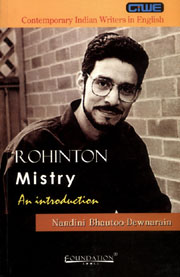Book contents
- Frontmatter
- Contents
- Series Editor's Preface
- 1 Introduction
- 2 The Local and the Universal
- 3 ‘Otherness’ in Mistry
- 4 Politics in Mistry's Fiction
- 5 Recurring Themes
- 6 Rohinton Mistry and Indian Writing in English
- Topics for Discussion
- Appendix A The 1975 Emergency
- Appendix B MISA
- Appendix C The History of the Bangladesh Conflict
- Appendix D List of Honours and Awards
- Bibliography
2 - The Local and the Universal
Published online by Cambridge University Press: 05 November 2011
- Frontmatter
- Contents
- Series Editor's Preface
- 1 Introduction
- 2 The Local and the Universal
- 3 ‘Otherness’ in Mistry
- 4 Politics in Mistry's Fiction
- 5 Recurring Themes
- 6 Rohinton Mistry and Indian Writing in English
- Topics for Discussion
- Appendix A The 1975 Emergency
- Appendix B MISA
- Appendix C The History of the Bangladesh Conflict
- Appendix D List of Honours and Awards
- Bibliography
Summary
This chapter provides an overview of Rohinton Mistry's fiction. It maps aspects of plot and theme as they evolve within the texts, while indicating continuities – of theme and concerns – from one text to the other.
Tales from Firozsha Baag
This short-story collection was published in 1987. It consists of twelve short stories, each dealing with aspects of the lives of the residents of Firozsha Baag, an apartment complex where Parsis are in the majority.
Most of the stories in this volume are marked by the use of dialogic narrative modes as they introduce the voices, tones and rhythms of the community's language and its social practices. These multi-voiced and dialogic narrative modes enable multiple perspectives within each of the stories, thus effecting a potentially post-modernist explosion.
Some of the themes in the collection are:
Tradition and memory
Nostalgia for the past
Faith
Minority rights
The old
The dilemmas of the young
Migration
Each story in this collection is complete in itself. However, the stories also form a pattern of inter-references that creates an impression of familiarity as the reader gradually gets a sense of a close-knit community. The limits of the Khodadad Building are physical boundaries symbolizing the cultural barriers woven around the Parsi community because of their ritualistic beliefs and their beliefs about the self as it fits into the community.
- Type
- Chapter
- Information
- Rohinton MistryAn Introduction, pp. 5 - 39Publisher: Foundation BooksPrint publication year: 2006



